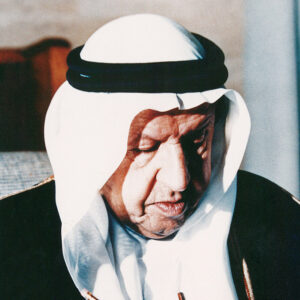Our Story
An Enduring Legacy
Our history is deeply connected to the life and legacy of our founder, Suliman Saleh Olayan. His values — hard work, determination, and professionalism — combined with an entrepreneurial spirit, continue to inspire us. Integrity was the foundation of his identity and reputation, and the lasting partnerships he built — many of which endure until today — were rooted in that principle. Suliman tackled every endeavor with dedication, reflected on his successes humbly, and gave generously in his community and beyond. His legacy remains our blueprint to continue advancing the company's mission ever forward for future generations.

“It takes a lifetime to build a reputation but only a moment to lose it. ”
Suliman S. Olayan (1918-2002)
Founder
Our Founder's Journey
Humble Beginnings
Suliman Olayan was born in 1918 to a merchant family in Unayzah, an oasis town located in north-central Saudi Arabia. For centuries, Unayzah had been a haven for caravans venturing across the Najd, Saudi Arabia’s heartland. The merchant families of Unayzah played a vital role in opening central Arabia to trade with the outside world. Orphaned as a very young child, Suliman was raised by his grandmother. When he was about 10 years old, Suliman left Unayzah for Bahrain where there were more opportunities and better economic prospects even before the age of oil. Suliman traveled with his older brother Hamad by camel to the Arabian Gulf coast and then by boat to Bahrain.
Photo: An old building in Unayzah.
Education
In Bahrain, Suliman attended local schools where he quickly mastered English. He proved to be an exceptional student with a sharp memory, great curiosity and an ability to identify possibility amidst challenge. In 1937, by then a young man, Suliman returned to Saudi Arabia to take a job with the California Arabian Standard Oil Company, forerunner of the Arabian American Oil Company, known today as Saudi Aramco. By 1947, Suliman had risen from transportation dispatcher to storehouse supervisor to a position in government relations. He later often said that Aramco was his ‘university,’ exposing him to best business practices at a time when Saudi Arabia’s oil industry was essentially an exciting startup.
History In The Making
Suliman joined Aramco in Dhahran just one year prior to the monumental discovery of oil there in commercial quantities. He was in the right place at the right time. He continued working for the company during World War II, when oil became a global strategic asset. Then, in April 1947, King Abdul Aziz Al Saud made a historic visit to Aramco headquarters in Dhahran. Suliman, by then a company liaison and translator, was at the center of it all.
Photo: Suliman (front row, third from left) stands between King Abdul Aziz and James MacPherson, Aramco’s Resident Administrative Officer.
Birth of an Enterprise
In the wake of World War II, the oil industry was expanding rapidly. Sensing a once-in-a-lifetime opportunity, Suliman set out on his own in the summer of 1947. With a personal loan secured on his home, he established General Contracting Company (GCC). GCC’s first customer was Bechtel, which was under contract to Aramco to manage the construction of the Trans-Arabian Pipe Line (Tapline), a mammoth project linking the oil wells in Saudi Arabia’s Eastern Province to a terminal in Lebanon on the Mediterranean Sea. GCC handled essential trucking and supply services for the historic project. GCC’s reliability established Suliman’s reputation as a dependable contractor who delivered high-quality work.
Photo: GCC operates Kenworth diesel trucks for hauling material and supplies to outlying areas, October 1955.
Pioneering Businesses
In the 1950s, buoyed by GCC’s success and with his entrepreneurial drive now in high gear, Suliman undertook a series of trailblazing projects. He played a key role in developing Saudi Arabia’s earliest electrical power companies ultimately founding the country’s first public utility, the National Gas Company. In 1954, he launched General Trading Company (GTC), a food and consumer products distribution business. That same year Suliman became instrumental in introducing commercial insurance to Saudi Arabia, founding Arab Commercial Enterprises (ACE), which went on to become the largest insurance and reinsurance broker in the Middle East.
Photo: Suliman (right) with Bill McMullen, Manager of Aramco’s Products Distribution Department.
Joint Ventures
Photo: An Olayan JV manufactures aluminum cans in the Eastern Province.
Investment
Suliman began investing internationally in the early 1960s with a small portfolio of US-listed companies. He bought minority stakes in corporations such as First Chicago, Occidental Petroleum, Transamerica, CS First Boston and Chase Manhattan among others, including European names such as National Grid of the UK. Under Suliman’s leadership, The Olayan Group expanded into private equity, real estate, and other alternative asset classes including direct investments and investments with leading regional and international partners. Suliman also expanded the Group’s geographic presence. In 1959, he opened a commercial and financial office in Beirut to support his growing commercial businesses in Saudi Arabia. In the 1970s he opened offices in New York, London, and Athens to support the Group’s international financial and investment activities.
Photo: Suliman in his town house offices. London, December 1983.
Leadership
Suliman held leadership roles on boards and councils of established corporations and institutions. Within Saudi Arabia, he was the founding chairman of both The Saudi British Bank and Saudi Spanish Bank. He served on the boards of Saudi Aramco, Saudi Arabian Airlines, and Riyadh Bank. Suliman chaired the Riyadh Chamber of Commerce and Industry and later, the Council of Saudi Chambers. From 1980 to 1992, he co-chaired the high-level US-Saudi Arabian Businessmen’s Dialogue. Internationally, Suliman served on the boards of CS First Boston, the Peterson Institute for International Economics in Washington, and the American University of Beirut, which named its business school after him in 2003. He was named Knight Commander of the Civil Division of the Most Excellent Order of the British Empire (KBE) by Queen Elizabeth II. He received the Great Cross of the Order of Merit from King Juan Carlos of Spain. And he was named Commander First Class of the Royal Order of the Polar Star by King Carl XVI Gustaf of Sweden.
Photo: British Ambassador to Saudi Arabia Stephen Egerton presents Suliman with his KBE Insignia 1987
Philanthropy
Suliman believed that giving to those in need is not an obligation, but a privilege. The Suliman S. Olayan Foundation, the philanthropic arm of The Olayan Group, was founded in 1982 to positively impact communities in Saudi Arabia, the Middle East, and beyond. Suliman concentrated his philanthropy on two of his greatest interests: education and healthcare. He placed particular importance on education, often telling his employees and children: Whatever you learn you elevate yourself. Endowed scholarships named after Suliman at several universities will continue to benefit students in the years to come, as will the Suliman S. Olayan School of Business at the American University of Beirut.
Lasting Legacy
Suliman Olayan passed away in July 2002 at the age of 83, but his legacy endures. The Olayan Group remains guided by the vision of this self-made business prodigy. He journeyed from Unayzah to Wall Street during an era in which caravans gave way to global commerce. Along the way, his values – hard work, determination, insatiable curiosity, and professionalism – became embedded in the enterprise that thrives today.
Photo: A painted portrait of our late founder Suliman S. Olayan
